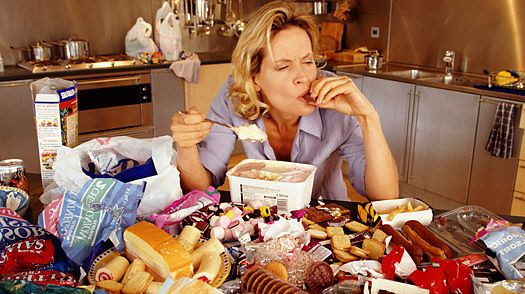Happy Eating And Obesity: Happiness Tied To Comfort Eating And Weight Gain

Who says you overeat when you're sad?
It turns out that people tend to eat more when they're in a happier mood, and it's an emotional eating habit that's unfortunately being widely ignored, according to researchers.
Dutch researchers from Maastricht University published their findings in the journal Appetite and detailed what they call "happy eating." Moreover, they're targeting this condition as a contributor to the obesity epidemic affecting millions around the globe.
"Emotional eaters are often presumed to eat in response to negative emotions, while positive emotions have been largely neglected," Peggy Bongers of the faculty of psychology and neuroscience at Maastricht University, and co-authors wrote in the study.
"The current findings underline the importance of positive emotions in emotional eating, and provide new insights on the relationship between eating and mood melioration."
In the United States, ranked number one on the obesity scale where more than a third of the adults are obese, stress, depression, and boredom are largely associated with comfort eating.
To bring attention back to happier individuals, who are underestimated in the comfort eating category, the study's researchers gathered 87 students and explored each of their eating habits and mental statuses through questionnaires.
The next step was to show them scenes from movies that induced either a positive, neutral, or negative emotion. They found that the students who watched a positive scene were eating more than their sad counterparts. In addition, the happier people overindulged while the upset participants did not.
The study used classic positive show and film scenes such as "Mr. Bean" when the lead actor attempts to cheat from another student's exam and When Harry Met Sally where Meg Ryan performs her iconic orgasm scene at a diner.
Neutral emotion-inducing scenes were retrieved from fishing documentaries, while the negative moods were evoked using The Green Mile where the innocent inmate, played by Michael Clarke Duncan, gets executed in the electric chair.
"Most emotional eating is related to negative moods," researchers wrote. "However, volunteers did not overeat in response to negative emotions but did overeat in response to positive ones."
Eating during special and joyous occasions also increases calorie intake, just as much as eating during times of sadness. Experts say the difference would be the setting; a happier person would overeat at social events while sad individuals would isolate themselves and binge.
Another study from 2002 involved men and the effect of their different emotions on eating. It showed that joy induced an individual to eat more chocolate, which was the food used in the experiment, while they watched movies. In addition, the chocolate reportedly tasted more pleasant when the participan was happy as opposed to sad. In this case, quality of emotions motivated the individual to eat.
According to TeensHealth, emotional eating is a huge problem for children when they start using food as a way to control emotion rather than to satisfy hunger, and it ultimately affects their weight, health, and the well-being.
Experts say teens and adults should compare what's driving their health, even if it's evoked by sadness or happiness. For instance when you're hungry, you gradually pace yourself and sometimes postpone your meal, while emotional hunger is experienced suddenly and triggers urgency to eat and even stimulates specific cravings.
More comparison tools can be found at Nemours' KidsHealth.



























